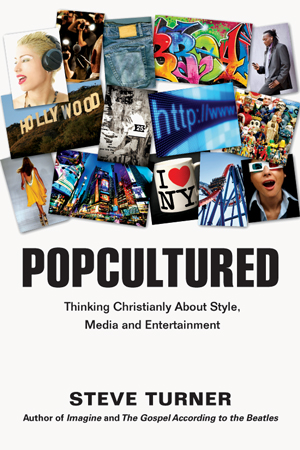 What does popular culture have to do with the Christian faith? At times, it might seem that they stand in opposition. Violent films, explicit lyrics and celebrity gossip can drive some Christians away. But others spend hours every week listening to top-40 radio, browsing the Internet and playing the latest video games. What's the right approach?
What does popular culture have to do with the Christian faith? At times, it might seem that they stand in opposition. Violent films, explicit lyrics and celebrity gossip can drive some Christians away. But others spend hours every week listening to top-40 radio, browsing the Internet and playing the latest video games. What's the right approach?
With Popcultured, Steve Turner offers answers to both questions, arguing that Christians should not reject popular culture in its entirety but also should not just embrace it wholesale. A Christian approach to pop culture requires spiritual and critical engagement.
Turner begins the book by outlining several reasons why culture matters, pointing out that we can learn from culture (“Truth is truth whoever may say it, and because people are made by God they can't help discovering and passing on truth”), and that pop culture is an important forum for ideas and debate. The cultural revolution of the 1960s, for example, was largely aided by musicians and filmmakers who saw the opportunity for change and seized it. If Christians want to play a meaningful part in the ongoing cultural debate, we have to understand the language and arguments being used before we jump in and try to contribute—as the Apostle Paul did when he approached the Athenians at the Areopagus (see Acts 17:16-34).
After arguing in favour of engagement with popular culture, Turner discusses various kinds of media and suggests a Christian approach to each. Popcultured covers everything from movies and television, to journalism, fashion, photography and advertising. Regardless of the medium, his guiding principle is Paul's instruction that we test everything and hold fast to what is good (see 1 Thessalonians 5:21). At the same time, he cautions readers to use their time wisely, arguing that being constantly “plugged in” can hinder the meditative life. Popcultured is practical throughout—each chapter ends with questions for reflection or discussion, a list of resources for further reading and five suggestions for action.
Turner tries to cover a lot of ground in just 250 pages—and because of that, Popcultured feels more like a collection of articles than a typical book. But Turner's book is united by the theme that culture is not inherently bad and, with the right kind of engagement, can yield enormous benefits.









Leave a Comment